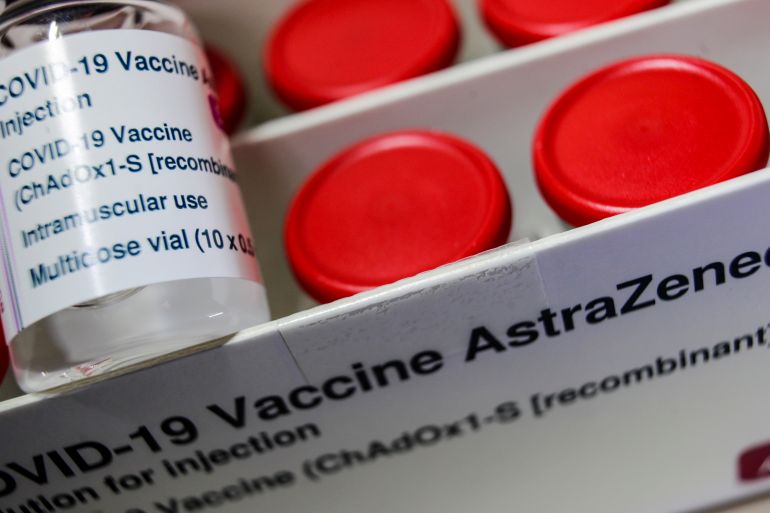Denmark ditches AstraZeneca’s COVID-19 shot over blood clot risk
In world-first move, Denmark stops using AstraZeneca’s vaccine altogether, citing ‘real risk’ of serious side effects.

Denmark has become the first country to halt all use of AstraZeneca’s COVID-19 vaccine after recent reports of rare but serious side effects among a small minority of recipients of the shot.
The move will push back the scheduled conclusion of the Scandinavian country’s vaccination scheme to early August from July 25.
Keep reading
list of 4 itemsAustralia drops vaccine goal after AstraZeneca advice change
What are implications after regulators’ AstraZeneca jab findings?
AstraZeneca vaccine comes under further pressure in EU, UK
It comes despite recommendations from the World Health Organization and the European Medicines Agency (EMA) – the European Union’s medicines regulator – to continue using the AstraZeneca vaccine.
Both bodies have repeatedly said the benefits of the shot outweigh any potential risks associated with its use after its use was linked to several cases of severe blood clots, some of which proved fatal.
But the Danish Health Authority said in a statement on Wednesday that the results of its own investigations showed there was a “real risk of severe side effects associated with using the COVID-19 vaccine from AstraZeneca”.
The agency’s head, Soren Brostrom, said the probe indicated one in 40,000 recipients of the shot would develop serious side effects.
“Based on an overall consideration, we have therefore chosen to continue the vaccination programme for all target groups without this vaccine,” he added.
The Danish Health Authority said that the availability of other vaccines combined with the pandemic being under control in the Scandinavian country at the moment meant the inoculation campaign could continue without the AstraZeneca shot.
AstraZeneca said it respected Denmark’s choice and would continue to provide it with data to inform future decisions.
“Implementation and rollout of the vaccine programme is a matter for each country to decide, based on local conditions,” the Anglo-Swedish company said.
Almost one million of Denmark’s 5.8 million-strong population have received a first dose of a COVID-19 vaccine to date.
Nearly four-fifths of recipients have been given a dose of the vaccine produced by Pfizer-BioNTech. The Scandinavian country has also used the vaccine developed by Moderna in its immunisation drive.
EMA review
EU member Denmark was the first country to initially suspend all usage of the AstraZeneca vaccine over safety concerns last month, after the reports of rare but serious cases of blood clots developing in some people who were given the shot first emerged. More than a dozen countries later followed suit.
All but a few have since resumed use of the vaccine, which was developed by the company in partnership with the United Kingdom’s University of Oxford, following a review by the EMA which deemed the shot “safe and effective”.
The EU’s medicines watchdog said last week it had found a possible link between the AstraZeneca jab and cerebral venous sinus thrombosis (CVST), a brain blood clot, but said the risk of dying from COVID-19 was “much greater” than the risk of mortality from rare side effects.
As of April 4, the EMA had received reports of 169 cases of CVST after 34 million Astrazeneca doses had been administered in the European Economic Area, it said.
The EU regulator, however, left it to individual states to make their own risk assessments and decide how to administer the vaccine.
Although many countries in Europe and elsewhere have since resumed administering the shot, some have restricted its use to certain age groups, often those aged above 50 or above 60.
Johnson & Johnson delays Europe vaccine rollout
In a separate blow to Europe’s faltering mass immunisation campaign, United States-based pharmaceutical giant Johnson & Johnson (J&J) delayed the deployment of its own COVID-19 shot across Europe following concerns over the risk of blood clotting in some recipients of the vaccine.
The EMA said it expected to issue a recommendation on the vaccine next week but that it continued to believe the benefits of the shot outweighed the risks of side effects.
US federal health agencies recommended pausing use of the vaccine for at least a few days after six women under age 50 developed rare blood clots after receiving it.
Deliveries had already begun in some European countries but authorities took differing approaches on whether to restrict use of the vaccine, with Belgium and France saying they would go ahead while Greece and Italy put them on hold.
The EMA said J&J was in contact with national authorities and recommended storing doses already received until the safety committee issued an expedited recommendation.
The delay will do little to assuage concerns across Europe over the EU’s choppy vaccine rollout, which has been hit by problems ranging from poor coordination between national and regional authorities to procurement difficulties and a damaging contractual row with AstraZeneca.
In what appeared to be a stinging rebuke to the Anglo-Swedish company, the 27-member bloc on Wednesday announced plans to negotiate a massive contract extension for Pfizer-BioNTech’s COVID-19 vaccine, insisting it had to go with companies that had shown their value in the pandemic.
“We need to focus on technologies that have proven their worth,” said EU Commission President Ursula von der Leyen.